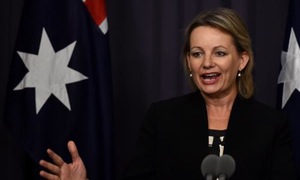
The federal government has announced it will extend funding for a number of mental health programs for 12 months, following pressure from lobby groups.
Funding for some community mental health organisations was due to expire at the end of the financial year, which mental health advocacy groups said would mean the loss of services affecting thousands of people.
The health minister, Sussan Ley, on Thursday announced that the programs, worth $300m, would continue for another year while the government worked through the findings of a report into the sector undertaken by the Mental Health Commission.
“It’s important this opportunity for positive reform isn’t rushed,” Ley said. “Therefore extending funding for another 12 months will provide frontline mental health services with clarity and certainty while we work through the complex issues raised in the review.”
Around 70 organisations had issued a plea to the federal government last month to continue funding their organisations in order to continue providing services and avoid sacking staff.
David Meldrum from the Mental Illness Fellowship of Australia said that he was “really pleased” by the funding announcement, which will provide certainty for suicide prevention services like Lifeline, Sane and RU OK Day.
“Many thousands of Australians have been helped by these programs,” he said.
Frank Quinlan from Mental Health Australia said that his organisation is looking forward to working with the government on securing more long-term funding arrangements.
“If our mental health system is to be more effective and efficient we must set clear targets and indicators for its performance,” Quinlan said. “We must have clear agreements about who is responsible for what.”
“Ultimately, we must move away from short term planning, short term contracts, and develop a 10-year plan for reform. We hope that the National Mental Health Commission’s review of mental health will be the first step in this reform process,” he said.
St Vincent’s Health Australia wants the government to urgently release the findings of the review. Its chief executive, Toby Hall, said: “We have no time to waste. The government received the Mental Health Commission’s report in November. Six months later, it needs to see the light of day so we can provide comment and get the ball rolling on improving the system.”
The government has backed down on a number of funding cuts in recent weeks.
On 31 March, the assistant health minister, Fiona Nash, announced drug and alcohol treatment programs costing the commonwealth $87m would continue for one year.
A week before that, attorney general George Brandis announced that the government would reverse cuts made to the legal aid sector in the last federal budget. The government would have saved $25m by axing assistance. A few days before that, homelessness services were given a funding extension of two years, at a cost of $230m to the government.
At the start of March, Indigenous community controlled health organisations were told that their funding would be extended for another 12 months, to the tune of $1.2bn.
Education minister Christopher Pyne admitted that it was a mistake to threaten $150m worth of funding cuts for a science research program if higher education reforms were not passed. The threat was dropped, as eventually were the reforms.
The prime minister, Tony Abbott, raised the pay offer to defence force personnel to 2% after being criticised for the original 1.5% offer, which advocates say would have amounted to a pay cut in real terms.
